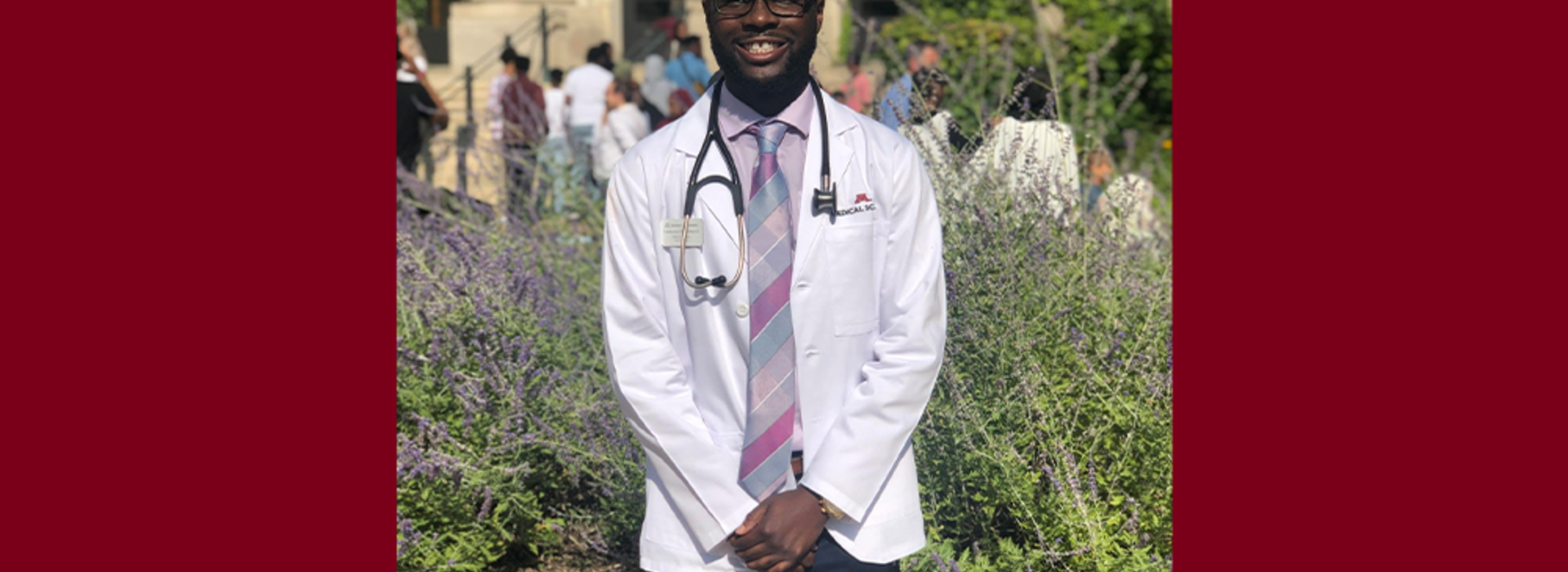
Emmanuel Okematti '23 is Part of the Next Generation of Neurology Leaders and Current Schut Scholar
Emmanuel Okematti '23 is part of the next generation of neurology leaders and current Schut Scholar. Lawrence Schut, a graduate from the University of Minnesota Medical School Class of 1962, and his wife Loretta, created this scholarship to support future neurologists. The class of 1962 will celebrate their 60th Medical School reunion as Okematti begins his final year of medical school. Read on to get acquainted with the current Schut Scholar, including what inspired him to pursue medicine, what attracted him to the U of M and the impact of receiving a scholarship.
Undergraduate School: University of Minnesota - Twin Cities
Undergraduate Major/Minor: Neuroscience/Chemistry
When and why did you decide to become a physician?
My journey to medicine probably started around the time I began to realize the wide variety of neuro health issues seen throughout my family including strokes, dementia, neuropathy, along with health issues that could have been minimized or even prevented with earlier and proper intervention. The one that made the biggest impact on me was seeing an immediate family member struggle with the management of their glaucoma, leading to a surgery that most likely would not have been necessary had the appropriate measures been taken prior to. As I grew older, I learned that this improper management was not due to negligence but rather an unwelcoming feeling in clinics/hospitals and a lack of trust in healthcare. Seeing that the overlap between possibly alleviating neuro-related health issues and promotion of trust within the healthcare system overlies in the field of medicine, that is why I would like to be a physician.
Why did you choose the U of M Medical School?
I chose to attend the U of M Medical School due to many of the amazing and upcoming things happening here. The school's dedication to student mental health, improving learning experiences and promoting community and diversity were huge to me. Being able to have access to many of the hospitals in the greater Twin Cities area was also very important to me, letting me know I will be getting a variety of healthcare experiences and working with different doctors serving different patient populations. Finally, the school's demonstrated interest in being at the forefront of neuroscience was big to me, with neuroscience being one of my largest interests. The number of innovative projects going on here is amazing, and I cannot wait to be a part of one if not many of them.
Now that you are a third year student, are you still interested in neuroscience and neurology?
I am definitely still interested in neurology. During my time in medical school, I have been fortunate to shadow a neurologist and a neuroradiologist, do research with a variety of vascular neurologists here at the U of M, and last year I served as president of the Student Interest Group in Neurology. I have really enjoyed my rotations in neurology and neurosurgery, and I have continued to enjoy learning about how neurological diseases affect quality of life for students, while at the same time we are making a variety of advancements in the field to manage neurological conditions, improve quality of life and sometimes even regain certain functioning. I’ve been especially active in research, contributing to projects studying different treatment protocols for ischemic stroke and analyzing angiograms performed by neurosurgery residents and endovascular surgical neurology fellows over a period of five years. I am currently working on a research project investigating the necessity of transferring patients for post thrombolytic neurological monitoring. I have also continued working in my undergraduate research lab studying the pathophysiology of Parkinson's disease in genetic mouse models.
What do you remember about your first day of medical school?
The first day of medical school was much of a blur. Luckily, we were done with class by noon so the rest of the day was spent trying to figure out if I had really learned anything with my current study habits or if anything needed to be changed. Overall though, it was extremely relaxing and a wonderful way to ease into medical school.
What unique perspective do you bring to medical school that will help you become an excellent physician?
I think I bring an important perspective of understanding what it is like to be underrepresented and even feel marginalized in the community. Knowing this, and that many of the future patients I will be serving also have similar feelings, will be important towards building a bridge of trust between myself and my patients, along with my patients and healthcare. By doing this, I hope to help keep patients using healthcare when they need it instead of avoiding it because they think the service does not serve them fully.
How did it feel when you learned you had received a scholarship?
It was amazing to learn I had received a scholarship. It made both me and my parents extremely happy, and we are so fortunate for the generosity of the donors and their desire to choose me to receive this award. To my scholarship donors, I cannot thank you enough for your generosity, it really means the entire world to me to be able to have some of my medical education paid for and to have that much less debt to worry about later in life. Thank you so much.
For more information about how you can create your own scholarship for medical students, contact Elsa Scheie, Development Officer at the U of M Foundation, at escheie@umn.edu or 612-625-7947. For more information about 2022 reunions and the Alumni Celebration, visit this website.